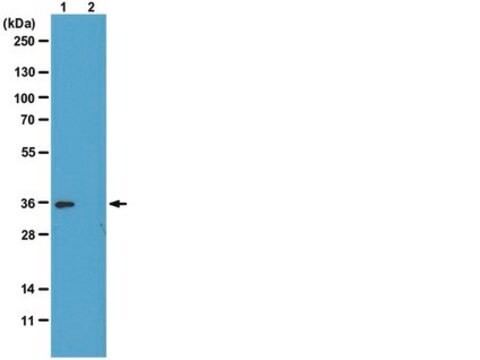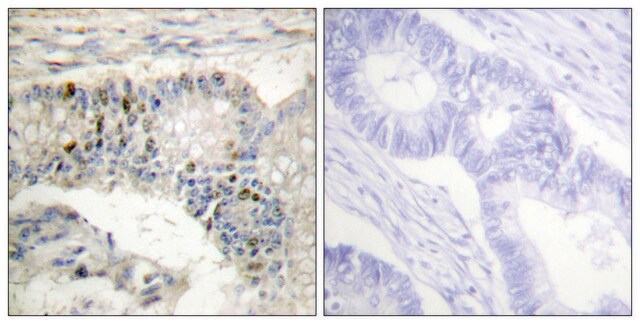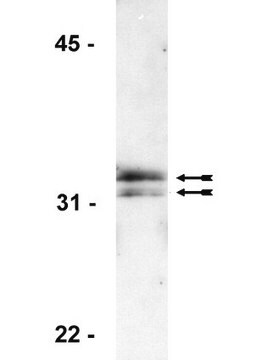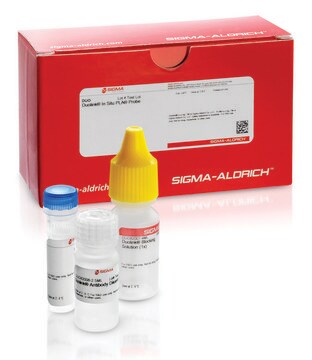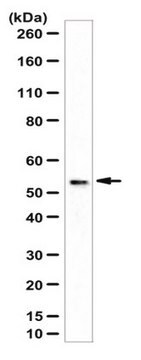06-597
Anti-phospho-Histone H1 Antibody
Upstate®, from rabbit
Sign Into View Organizational & Contract Pricing
All Photos(1)
About This Item
UNSPSC Code:
12352203
eCl@ss:
32160702
NACRES:
NA.41
Recommended Products
biological source
rabbit
Quality Level
antibody form
affinity purified immunoglobulin
antibody product type
primary antibodies
clone
polyclonal
species reactivity
bovine, human
packaging
antibody small pack of 25 μg
manufacturer/tradename
Upstate®
technique(s)
immunocytochemistry: suitable
western blot: suitable
isotype
IgG
NCBI accession no.
UniProt accession no.
shipped in
dry ice
target post-translational modification
phosphorylation (not specified)
Gene Information
human ... HIST1H1C(3006)
General description
Histone H1 is one of the five main histone proteins involved in the structure of chromatin in eukaryotic cells. Featuring a main globular domain and a long N-terminal tail, H1 is involved with the structure of the nucleosomes of the ′beads on a string′ structure.
The N-terminal tail of histone H1 protrudes from the globular nucleosome core and can undergo several different types of epigenetic modifications that influence cellular processes. These modifications include the covalent attachment of methyl or acetyl groups to lysine and arginine amino acids and the phosphorylation of serine or threonine.
The N-terminal tail of histone H1 protrudes from the globular nucleosome core and can undergo several different types of epigenetic modifications that influence cellular processes. These modifications include the covalent attachment of methyl or acetyl groups to lysine and arginine amino acids and the phosphorylation of serine or threonine.
Specificity
Recognizes phospho-Histone H1, Mr 32 kDa. Additional proteins were also detected, Mr 66 and 100 kDa.
Immunogen
Hyper-phosphorylated isoform of tetrahymena Histone H1 purified by cation-exchange HPLC
Application
Anti-phospho-Histone H1 Antibody is a high quality Rabbit Polyclonal Antibody for the detection of phospho-Histone H1 & has been validated in ICC & WB.
Research Category
Epigenetics & Nuclear Function
Epigenetics & Nuclear Function
Research Sub Category
Histones
Histones
Quality
Immunoblot Analysis: 0.5-2 μg/mL detected phosphorylated Histone H1 from acid extracts of colcemid treated HeLa cells but not untreated HeLa cells (Catalog # 17-306).
Immunocytochemistry: 5-10 μg/mL showed positive immunostaining for Histone H1 in mitotic HeLa cells fixed with 95% ethanol/5% glacial acetic acid (v/v).
Immunocytochemistry: 5-10 μg/mL showed positive immunostaining for Histone H1 in mitotic HeLa cells fixed with 95% ethanol/5% glacial acetic acid (v/v).
Target description
32 kDa
Physical form
Format: Purified
Immunoaffinity Purified immunoglobulin in 0.02M Phosphate Buffer, 0.25 M NaCl, pH 7.6 with 15 mg/mL BSA containing no preservatives.
Protein A purified
Storage and Stability
Maintain for 2 years at -20°C from date of shipment. Aliquot to avoid repeated freezing and thawing. For maximum recovery of product, centrifuge the original vial after thawing and prior to removing the cap.
Analysis Note
Control
Positive Antigen Control: Catalog #12-309, Hela cell nuclear extract. Add an equal volume of Laemmli reducing sample buffer to 10 μL of extract and boil for 5 minutes to reduce the preparation. Load 20 μg of reduced extract per lane for minigels.
Positive Antigen Control: Catalog #12-309, Hela cell nuclear extract. Add an equal volume of Laemmli reducing sample buffer to 10 μL of extract and boil for 5 minutes to reduce the preparation. Load 20 μg of reduced extract per lane for minigels.
Other Notes
Concentration: Please refer to the Certificate of Analysis for the lot-specific concentration.
Legal Information
UPSTATE is a registered trademark of Merck KGaA, Darmstadt, Germany
Disclaimer
Unless otherwise stated in our catalog or other company documentation accompanying the product(s), our products are intended for research use only and are not to be used for any other purpose, which includes but is not limited to, unauthorized commercial uses, in vitro diagnostic uses, ex vivo or in vivo therapeutic uses or any type of consumption or application to humans or animals.
Not finding the right product?
Try our Product Selector Tool.
Certificates of Analysis (COA)
Search for Certificates of Analysis (COA) by entering the products Lot/Batch Number. Lot and Batch Numbers can be found on a product’s label following the words ‘Lot’ or ‘Batch’.
Already Own This Product?
Find documentation for the products that you have recently purchased in the Document Library.
Generation and characterization of novel antibodies highly selective for phosphorylated linker histone H1 in Tetrahymena and HeLa cells.
Lu, M J, et al.
Chromosoma, 103, 111-121 (1994)
Diego Piedrahita et al.
Frontiers in cellular neuroscience, 9, 498-498 (2016-01-19)
β-site APP cleaving enzyme 1 (BACE1) initiates APP cleavage, which has been reported to be an inducer of tau pathology by altering proteasome functions in Alzheimer's disease (AD). However, the exact relationship between BACE1 and PHF (Paired Helical Filaments) formation
Steven J T Jackson et al.
Carcinogenesis, 25(2), 219-227 (2003-10-28)
Sulforaphane (SUL), an isothiocyanate found in broccoli and other cruciferous vegetables, has been shown to induce phase II detoxification enzymes, inhibit chemically induced mammary tumors in rats, and more recently to induce cell cycle arrest and apoptosis in cancer cells
Cyclin-dependent kinase 1-mediated Bcl-xL/Bcl-2 phosphorylation acts as a functional link coupling mitotic arrest and apoptosis.
David T Terrano,Meenakshi Upreti,Timothy C Chambers
Molecular and cellular biology null
A simplified formaldehyde fixation and immunoprecipitation technique for studying protein-DNA interactions.
Dedon, P C, et al.
Analytical biochemistry, 197, 83-90 (1991)
Our team of scientists has experience in all areas of research including Life Science, Material Science, Chemical Synthesis, Chromatography, Analytical and many others.
Contact Technical Service
